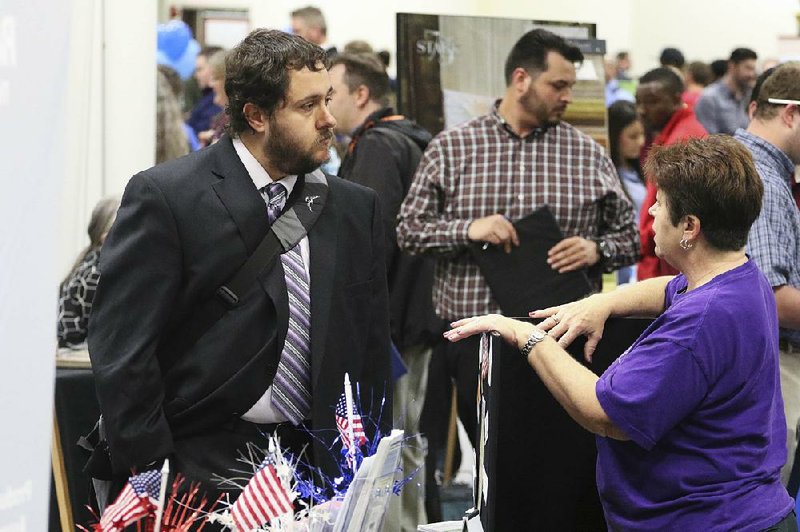WASHINGTON -- U.S. job openings rose in February to the highest level in 14 years, the Labor Department reported Tuesday.
Hiring slowed, fewer Americans quit their jobs and layoffs fell sharply, the report said, suggesting that signs of a stumbling economy prompted U.S. businesses to pull back payroll additions. But they weren't spooked enough to cut more jobs.
The number of positions waiting to be filled in February climbed 3.4 percent to 5.13 million, the most since January 2001.
The sharp rise in open jobs "is a reassuring sign that the fundamentals of the labor market have continued to improve," said Jeremy Schwartz, an analyst at Credit Suisse.
The government said last week that employers added just 126,000 jobs in March, the fewest in 15 months. Many economists blamed that weak figure on temporary factors, such as harsh winter weather, a labor dispute at West Coast ports that disrupted shipping, and a stronger dollar that has hurt U.S. export sales.
The disappointing jobs report Friday came after a raft of data suggesting that the economy faltered in the first three months of this year. Consumers have been reluctant to increase spending, and have been holding on to much of the cash saved from cheaper gasoline prices. Fewer exports have lowered factory output. Home construction also has been weak.
The jobs figures reported Friday are a net figure -- jobs gained minus jobs lost. The data reported Tuesday are more detailed. They calculate total hires, as well as resignations and layoffs. Tuesday's data also reflect data for February, and are a month behind last week's jobs report.
Despite the rise in openings, Tuesday's data also showed that total hiring in February slipped 1.6 percent to 4.9 million. That may reflect caution on the part of employers. It also suggests that they may be having trouble finding workers with the skills they need.
Some economists say that employers are not offering enough pay to fill their available jobs. Rising openings could force businesses to offer higher wages.
There are some signs that may already be happening. Retailers had nearly 30,000 more open jobs in February than the previous month, and hotels and restaurants posted 37,000 more jobs. Yet neither sector filled all those jobs: Retail hiring fell in February compared with the previous month, while hotel and restaurant hiring rose by a smaller amount than openings.
"Firms are indicating they're happy to hire," said Thomas Costerg, an economist at Standard Chartered Bank in New York. "They're looking through the current softness and seeing some bright times ahead. It bodes well for future payrolls growth."
Many companies in those sectors have announced wage increases in recent months, including Wal-Mart, McDonald's, Ikea, and TJX Cos., the parent of discount store operator TJ Maxx and Marshall's.
Average hourly earnings rose 0.3 percent in March, the government said last week, a sign wages may be perking up. But they are still just 2.1 percent higher than a year ago, similar to the tepid gains that have occurred since the recession ended in June 2009.
Layoffs, meanwhile, plummeted 7.6 percent to 1.6 million, the lowest level in 16 months. That points to a high degree of job security for those Americans who are employed.
The number of people quitting their jobs slipped 3.3 percent to 2.7 million, the report showed. That is still 10.2 percent higher than a year ago. More people quitting can be a good sign for the economy, because people typically quit when they have found other jobs, usually at higher pay.
Tuesday's Job Openings and Labor Turnover Survey from the Labor Department underscores the improvement that Federal Reserve policymakers are monitoring as they consider when to begin raising interest rates.
Federal Reserve Bank of New York President William Dudley, in a speech Monday, said he'll be watching "to determine whether the softness in the March labor market report evident on Friday foreshadows a more substantial slowing in the labor market than I currently anticipate."
The Fed last month dropped an assurance that it will be "patient" on the timing of tightening, while also reducing its forecasts for the benchmark interest rate. Federal Reserve Chairman Janet Yellen said after policymakers' March meeting that the change in guidance doesn't mean they will be "impatient" to start raising rates.
Information for this article was contributed by Christopher S. Rugaber of The Associated Press and by Shobhana Chandra and Jordan Yadoo of Bloomberg News.
A Section on 04/08/2015
